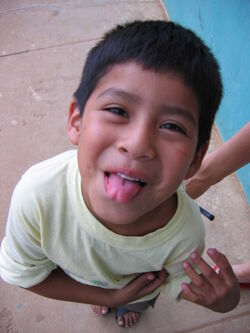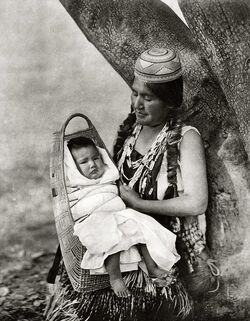Assessment |
Biopsychology |
Comparative |
Cognitive |
Developmental |
Language |
Individual differences |
Personality |
Philosophy |
Social |
Methods |
Statistics |
Clinical |
Educational |
Industrial |
Professional items |
World psychology |
Developmental Psychology: Cognitive development · Development of the self · Emotional development · Language development · Moral development · Perceptual development · Personality development · Psychosocial development · Social development · Developmental measures
A female child
A child (plural: children) is a young human. Depending on context it may mean someone who is not yet an adult, or someone who has not yet reached puberty (someone who is prepubescent).
Child is also a counterpart of parent: adults are the children of their parents despite their maturation beyond infancy; for example "Benjamin, aged 46, is the child of Tobias, aged 73". Similarly in a generalized sense, see child node.
Gender[]
A female child is called a girl and a male child is called a boy.
Development[]
Child development is the study or examination of processes and mechanisms that operate during the physical and mental development of an infant into an adult.
Pediatrics is the branch of medicine relating to the care of children. It encompasses ages from prenatal to teenagers and even young adults (ages 0-21 years).
Terms for stages of age-related physical development are listed below. Approximate age ranges are shown, but conceptions about the boundaries between different stages of life vary between cultures and periods. The age ranges and terms listed reflect 21st century conceptions in the developed world.

Boy showing tongue.
- Zygote, the point of Conception, fertilization
- Embryo; in the later stages also called fetus
- Birth
- Child
- Infant (baby, newborn) (0-1.5)
- Toddler (1.5-4)
- Primary school age (also called prepubescence) (4-11)
- Elementary school age (also called middle childhood) (4-11)
- Preadolescence (preteen, or late childhood. The child in this and the previous phase are called schoolchild (schoolboy or schoolgirl), when still of primary school age.) (12+)
- Adolescence and puberty (teenage) (13-19)
- Young adult (18-25)
- Adult (18-21 or older; exact minimum age may vary)
- Early adulthood (16-39)
- Middle age (40-59)
- Advanced adult/Senior citizen (60+)
- Death (occurs at various ages depending on person)
Also sometimes used are terms that specify one's age in decades, such as:
- Twenty something (20-29)
- Thirty something (30-39)
- Forty something/Quadragenarian (rarely used since 1980)(40-49)
- Quinquagenarian (50-59)
- Sexagenarian (60-69)
- Septuagenarian (70-79)
- Octogenarian (80-89)
- Nonagenarian (90-99)
- Centenarian (100-109)
- Supercentenarian (110+)
Cognitive development[]
- Learning
- Music lessons
- Infant Education
- Language acquisition
- Developmental psychology
- Child art
Notable child prodigies[]

Hupa mother and child, by Edward S. Curtis, 1924
- Christian Friedrich Heinecken (The Infant of Lübeck)
- Isaac Albeniz
- Wolfgang Amadeus Mozart
- Sarah Chang
See also: Child prodigy
Human development[]
- Main article: Human development
Human development refers to all forms of development above, often in the context of clinical or developmental psychology, or as human development theory (in economics, an outgrowth of welfare economics).
Both the psychological and economic fields share a special concern with education and language fluency including literacy and numeracy, and with identification and development of more unique talents into the economic variable known as individual capital.
Earlier branches of economics see humans in terms of labour for production, means of persuasion or protection, which tend to be skills acquired only in adolescence and adulthood. The human development view is more evident in sports, music and other performing arts, such as acting where the child begins training often as early as three years of age. Think of Tiger Woods and his early practice golfing.
While there are problems with such early "streaming", child murder, child abandonment, military use of children and other major social ills are thought to be reduced by a human development approach – as there is a high value assigned to children by the state.
The UN Human Development Index is a means of measuring well-being used to rank states by these criteria. Although child abuse is thought to be lower in countries with a high ranking on this Index, that is not easily proven.
See also[]
Look up this page on
Wiktionary:
Childhood
List of child related articles
- Boy, Girl
- Child abandonment
- Child abuse
- Child custody
- Child discipline
- Child labor
- Child prodigy
- Child sexuality
- Child support
- Childcare
- Children in history
- Defense of infancy
- Education, School
- Fathers' rights
- Parenting
- Parental Alienation Syndrome
- Street children
- Children's street culture
- Taking Children Seriously
- Toy
- UNICEF
- Visitation
- Auxology
- Indigo children
References[]
External links[]
- Guide to Growing Up Wikibook - A wikibook covering ways to cope with many of the challenges of growing up.
- Ergonomics for children
- The Children's Corner-Helpful articles about children's health.
- Children according to Judaism
- All of Dr. Lowenstein's publications on the PAS
da:Barn de:Kind el:Παιδί es:Niño eo:Infano fr:Enfant ga:Leanbh id:Anak is:Barn he:ילדות lt:Vaikas mi:Tamariki nl:Kind no:Barn pt:Criança scn:Picciriddu simple:Child fi:Lapsi sv:Barn zh:儿童
| This page uses Creative Commons Licensed content from Wikipedia (view authors). |

